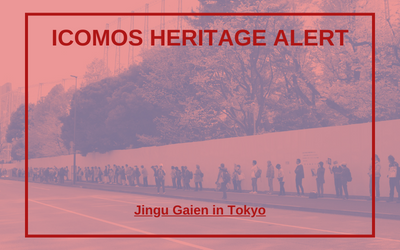Heritage Alert Jingu Gaien
 ICOMOS, together with its Japanese National Committee, is issuing a Heritage Alert to stop the destruction of approximately 3,000 trees and loss of open park space in Jingu Gaien, Tokyo, Japan. ICOMOS strongly warns against the construction of skyscrapers in a world-renowned park, without consultation with citizens and stakeholders. The redevelopement project is scheduled to begin in September.
ICOMOS, together with its Japanese National Committee, is issuing a Heritage Alert to stop the destruction of approximately 3,000 trees and loss of open park space in Jingu Gaien, Tokyo, Japan. ICOMOS strongly warns against the construction of skyscrapers in a world-renowned park, without consultation with citizens and stakeholders. The redevelopement project is scheduled to begin in September.
Jingu Gaien was created as a counterpart to Jingu Naien, and has a unique structure unparalleled in the history of parks around the world. Jingu Naien was intended to be an "eternal forest". In contrast, Jingu Gaien was designed to create a “forest for the people”. The park forms the core of the Garden City Park System in Tokyo and is an outstanding example of a citizen-owned park, unparalleled in the history of urban parks worldwide.
Urban parks are places for people’s recreation and also contribute to maintaining rich biodiversity. They mitigate the heat island effect in cities and provide shelter in case of natural disasters such as major earthquakes. Jingu Gaien, created through donations and voluntary work of citizens, represents an outstanding cultural heritage, unparalleled in the history of urban parks worldwide.
The focus of the Heritage Alert is the core of the Garden City Park System, facing immediate threat by urban redevelopment.
Created by Laboratory of Green Infrastructure in Research and Development Initiative, Chuo University.
Graphics by graphic designers Noriko & Isao Tsunoi.
In light of the above, ICOMOS is issuing this Heritage Alert and calls upon:
1. The project proponents - Mitsui Fudosan Co. Ltd., Meiji Jingu Shrine, Japan Sports Council, and Itochu Co. Ltd. – to immediately withdraw the redevelopment project of Jingu Gaien, fulfilling their social and ethical responsibilities as an international corporation, a religious association, and a fair and honest promoter of sports;
2. The Tokyo Metropolitan Government to review the relevant city planning decisions, recognizing that its decision to remove this urban park in favor of the construction of skyscrapers’ will permanently deprive citizens of their right to use the park and that the environmental impact assessment carried out for the redevelopment project has fundamental flaws and needs to be re-examined on the basis of best practice methodology;
3. The Meiji Jingu Shrine to immediately withdraw from the project, considering that Jingu Gaien was created thanks to the donations and voluntary labor provided by citizens, on the understanding that the promise to "maintain it as a beautiful park for eternity” would be fulfilled;
4. The Minato, Shinjuku, and Shibuya Wards to work on ensuring that Jingu Gaien is designated as a Place of Scenic Beauty, in the interest of future generations.
5. The national government of Japan to intervene, and not consider this a problem of Tokyo only.
The developer constructed a steel wall around Jingu Gaien to hide the urban forest from view
– in preparation for the start of tree felling this September. A human chain was organised in protest against this in April 2023.
ICOMOS Japan has presented an alternative plan that does not involve the cutting down of numerous trees and prevents the carbon emissions that would result from the present plans.
ICOMOS calls for the creation of a forum where diverse stakeholders can contribute to discussion on the future of the park.![]() Read our press release
Read our press release
![]() Read the letter sent to government and city officials
Read the letter sent to government and city officials
Photo Credits: Mikko Ishikawa
See also![]() Current Heritage Alerts
Current Heritage Alerts


